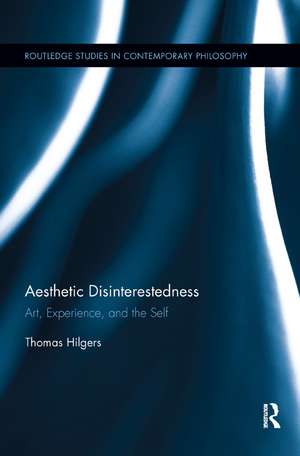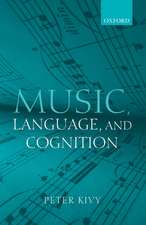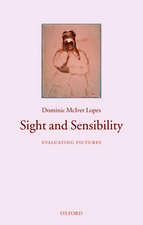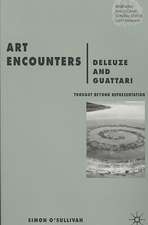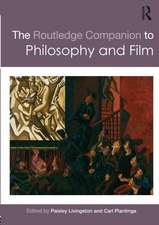Aesthetic Disinterestedness: Art, Experience, and the Self: Routledge Studies in Contemporary Philosophy
Autor Thomas Hilgersen Limba Engleză Paperback – 5 sep 2019
| Toate formatele și edițiile | Preț | Express |
|---|---|---|
| Paperback (1) | 381.72 lei 43-57 zile | |
| Taylor & Francis – 5 sep 2019 | 381.72 lei 43-57 zile | |
| Hardback (1) | 1054.27 lei 43-57 zile | |
| Taylor & Francis – 8 dec 2016 | 1054.27 lei 43-57 zile |
Din seria Routledge Studies in Contemporary Philosophy
-
 Preț: 311.41 lei
Preț: 311.41 lei -
 Preț: 325.92 lei
Preț: 325.92 lei - 8%
 Preț: 391.85 lei
Preț: 391.85 lei -
 Preț: 326.30 lei
Preț: 326.30 lei - 9%
 Preț: 903.33 lei
Preț: 903.33 lei -
 Preț: 311.41 lei
Preț: 311.41 lei -
 Preț: 309.90 lei
Preț: 309.90 lei - 9%
 Preț: 1003.55 lei
Preț: 1003.55 lei -
 Preț: 310.16 lei
Preț: 310.16 lei -
 Preț: 312.90 lei
Preț: 312.90 lei - 9%
 Preț: 936.26 lei
Preț: 936.26 lei -
 Preț: 307.69 lei
Preț: 307.69 lei -
 Preț: 304.05 lei
Preț: 304.05 lei -
 Preț: 313.34 lei
Preț: 313.34 lei -
 Preț: 381.07 lei
Preț: 381.07 lei -
 Preț: 310.88 lei
Preț: 310.88 lei - 9%
 Preț: 935.88 lei
Preț: 935.88 lei - 9%
 Preț: 1107.25 lei
Preț: 1107.25 lei - 18%
 Preț: 1114.98 lei
Preț: 1114.98 lei - 18%
 Preț: 1112.21 lei
Preț: 1112.21 lei - 18%
 Preț: 1058.43 lei
Preț: 1058.43 lei - 18%
 Preț: 1055.51 lei
Preț: 1055.51 lei -
 Preț: 387.16 lei
Preț: 387.16 lei - 18%
 Preț: 1120.20 lei
Preț: 1120.20 lei - 18%
 Preț: 1057.13 lei
Preț: 1057.13 lei -
 Preț: 481.58 lei
Preț: 481.58 lei - 18%
 Preț: 1112.83 lei
Preț: 1112.83 lei - 18%
 Preț: 1058.69 lei
Preț: 1058.69 lei - 18%
 Preț: 1108.73 lei
Preț: 1108.73 lei - 18%
 Preț: 1111.55 lei
Preț: 1111.55 lei - 18%
 Preț: 1051.90 lei
Preț: 1051.90 lei - 18%
 Preț: 1109.78 lei
Preț: 1109.78 lei - 18%
 Preț: 1110.11 lei
Preț: 1110.11 lei -
 Preț: 480.83 lei
Preț: 480.83 lei - 18%
 Preț: 1055.32 lei
Preț: 1055.32 lei - 18%
 Preț: 1115.69 lei
Preț: 1115.69 lei - 18%
 Preț: 1061.57 lei
Preț: 1061.57 lei - 18%
 Preț: 1113.16 lei
Preț: 1113.16 lei - 18%
 Preț: 1111.87 lei
Preț: 1111.87 lei - 18%
 Preț: 1053.95 lei
Preț: 1053.95 lei - 18%
 Preț: 1117.43 lei
Preț: 1117.43 lei - 18%
 Preț: 1059.84 lei
Preț: 1059.84 lei - 18%
 Preț: 1062.98 lei
Preț: 1062.98 lei - 18%
 Preț: 1064.70 lei
Preț: 1064.70 lei - 18%
 Preț: 1221.12 lei
Preț: 1221.12 lei - 18%
 Preț: 1108.24 lei
Preț: 1108.24 lei - 18%
 Preț: 1119.16 lei
Preț: 1119.16 lei - 18%
 Preț: 1060.25 lei
Preț: 1060.25 lei - 18%
 Preț: 897.16 lei
Preț: 897.16 lei
Preț: 381.72 lei
Nou
Puncte Express: 573
Preț estimativ în valută:
73.07€ • 79.39$ • 61.41£
73.07€ • 79.39$ • 61.41£
Carte tipărită la comandă
Livrare economică 21 aprilie-05 mai
Preluare comenzi: 021 569.72.76
Specificații
ISBN-13: 9780367361495
ISBN-10: 0367361493
Pagini: 200
Dimensiuni: 152 x 229 x 13 mm
Greutate: 0.27 kg
Ediția:1
Editura: Taylor & Francis
Colecția Routledge
Seria Routledge Studies in Contemporary Philosophy
Locul publicării:Oxford, United Kingdom
ISBN-10: 0367361493
Pagini: 200
Dimensiuni: 152 x 229 x 13 mm
Greutate: 0.27 kg
Ediția:1
Editura: Taylor & Francis
Colecția Routledge
Seria Routledge Studies in Contemporary Philosophy
Locul publicării:Oxford, United Kingdom
Public țintă
Postgraduate and UndergraduateCuprins
Introduction
1. Introducing Disinterestedness
2. Defending Disinterestedness
3. Explicating Disinterestedness
4. Generating Disinterestedness
Conclusion
1. Introducing Disinterestedness
2. Defending Disinterestedness
3. Explicating Disinterestedness
4. Generating Disinterestedness
Conclusion
Recenzii
"Thomas Hilgers's book is a distinctive and powerful contribution to an aesthetic theory of art ... Hilgers has worked out many of the details of a generally Kantian aesthetic theory of art and its value as fully as anyone, and his study significantly advances the discussion both of what art is and how and why it matters to us." – Notre Dame Philosophical Reviews
"Hilgers’s book is fascinating and carefully argued . . . Hilgers is widely conversant in Hermeneutics, Anglophone Philosophy, Contemporary Social theory, and the Arts. His voice is erudite and his reasoning intricate." – Carol S. Gould in The Journal of Aesthetics and Art Criticism
"Hilgers’s subtle book offers theorists interested in aesthetic experience and art an opportunity to reconsider disinterest, with its potential value, and perhaps limits, anew." – Samantha Matherne in Philosophy in Review
"This challenging volume bravely addresses some relevant yet still contentious questions of aesthetics . . . [It] is sound, serious, and thoroughly grounded: well-made arguments support the author’s claims and the ideas or theories of other authors are accurately presented when defending or grounding his own approach or when assessing them critically; possible objections are constantly considered and addressed." – Dan Eugen Ratiu in Estetika: The Central European Journal of Aesthetics
"Hilgers’ book is a major new contribution to a topic that is often too quickly dismissed in current debates about the nature of aesthetic experience, namely the historical and contemporary importance of the concept of disinterestedness." – Jane Kneller, Colorado State University, USA
"Hilgers’s book is fascinating and carefully argued . . . Hilgers is widely conversant in Hermeneutics, Anglophone Philosophy, Contemporary Social theory, and the Arts. His voice is erudite and his reasoning intricate." – Carol S. Gould in The Journal of Aesthetics and Art Criticism
"Hilgers’s subtle book offers theorists interested in aesthetic experience and art an opportunity to reconsider disinterest, with its potential value, and perhaps limits, anew." – Samantha Matherne in Philosophy in Review
"This challenging volume bravely addresses some relevant yet still contentious questions of aesthetics . . . [It] is sound, serious, and thoroughly grounded: well-made arguments support the author’s claims and the ideas or theories of other authors are accurately presented when defending or grounding his own approach or when assessing them critically; possible objections are constantly considered and addressed." – Dan Eugen Ratiu in Estetika: The Central European Journal of Aesthetics
"Hilgers’ book is a major new contribution to a topic that is often too quickly dismissed in current debates about the nature of aesthetic experience, namely the historical and contemporary importance of the concept of disinterestedness." – Jane Kneller, Colorado State University, USA
Descriere
This book introduces and defends a new account of aesthetic disinterestedness. Elaborating upon the work of Kant, Schopenhauer, and Bullough, Hilgers claims that artworks typically address our senses as well as our imagination, and require us to adopt a disinterested attitude towards what they show or present.
